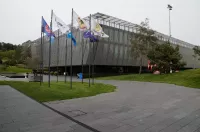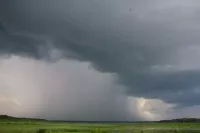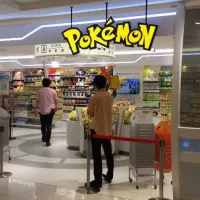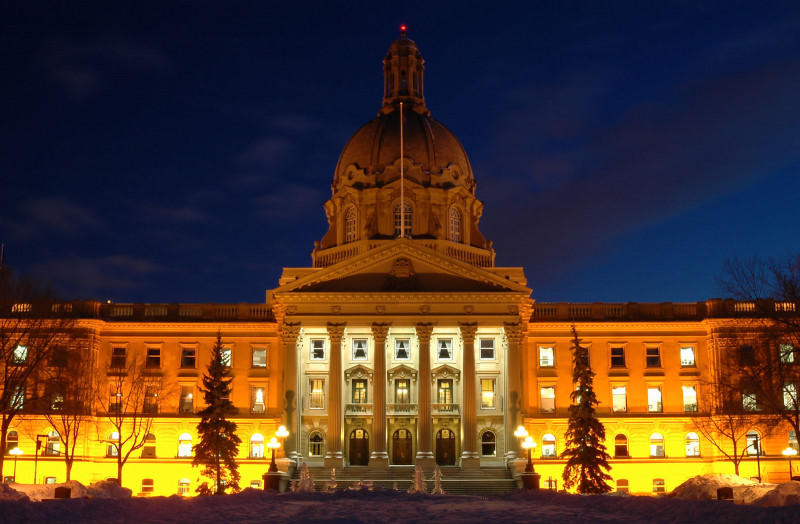Edmonton is the capital city of Alberta, Canada, located on the North Saskatchewan River. It serves as the core of the Edmonton Metropolitan Region and anchors the northern end of the Calgary-Edmonton Corridor.
1902: Power company bought by the Town of Edmonton
In 1902, the power company in Edmonton, which had been established in 1891, was bought by the Town of Edmonton. It remains under municipal ownership today as EPCOR.
1903: Edmonton Journal established
In 1903, the Edmonton Journal was established. It has a daily circulation of 112,000.
1904: Incorporation as a city
Edmonton was incorporated as a city in 1904 with a population of 8,350.
1904: Purchase of Edmonton District Telephone Company
In 1904, the City of Edmonton purchased the Edmonton District Telephone Company from Alex Taylor.
September 1, 1905: Alberta's Formation
On September 1, 1905, Edmonton became the capital of Alberta when the province was formed.
November 1905: Canadian Northern Railway Arrival
In November 1905, the Canadian Northern Railway (CNR) arrived in Edmonton, accelerating growth.
1905: Edmonton became Alberta's capital
In 1905 Edmonton became the capital of Alberta.
1905: Designation as the capital of Alberta
In 1905, Edmonton was designated as the capital of the new province of Alberta.
1905: Fort Edmonton Park Historical Representation
In 1905, Fort Edmonton Park's heritage is displayed through historical buildings, interpreters, and artifacts, representing the region's history and culture.
1907: Purchase of Edmonton Jewish Cemetery
In 1907, the Jewish Federation of Edmonton purchased the historic Edmonton Jewish Cemetery.
1911: Rutherford House History
In 1911, Rutherford House became the home of Alberta's first premier, Alexander Cameron Rutherford.
February 1, 1912: Strathcona Annexed by Edmonton
On February 1, 1912, the town of Strathcona was annexed by Edmonton.
1912: Amalgamation with the City of Strathcona
In 1912, Edmonton amalgamated with the City of Strathcona south of the North Saskatchewan River.
1912: Election of James East
In 1912, James East was elected as the first reformer.
1913: Early Incarnations of Edmonton Symphony Orchestra
Since 1913, the Edmonton Symphony Orchestra has existed under various forms.
1914: Population decline due to World War I
Just before World War I, in 1914, the city's population declined from more than 72,000.
1915: North Saskatchewan River flood
The North Saskatchewan River sometimes floods Edmonton's river valley, most notably in the North Saskatchewan River flood of 1915.
1917: Curtiss Stinson Special Aviation
The Alberta Aviation Museum has a Curtiss Stinson Special from 1917 on display.
1919: Edmonton general strike
In 1919, many thousands of workers participated in the Edmonton general strike.
1920: Fort Edmonton Park Historical Representation
In 1920, Fort Edmonton Park's heritage is displayed through historical buildings, interpreters, and artifacts, representing the region's history and culture. A recreation of a 1920s midway is present. A steam train, streetcars, automobiles and horse-drawn vehicles may be seen in operation.
1927: CKUA Began Broadcasting
In 1927, Edmonton's first major radio station, CKUA, began broadcasting music.
1929: Fort Edmonton Park Historical Representation
In 1929, Fort Edmonton Park's heritage is displayed through historical buildings, interpreters, and artifacts, representing the region's history and culture. Fort Edmonton represented the history until 1929.
1929: Labour representation on city council
In 1929, Labour representation on city council became a near-majority.
1929: Opening of the Edmonton City Centre Airport
In 1929, the Edmonton City Centre Airport opened, becoming Canada's first licensed airfield.
1932: Labour representation on city council
From 1932 to 1934, Labour representation on city council was a full majority during the Great Depression.
1934: Labour representation on city council
From 1932 to 1934, Labour representation on city council was a full majority during the Great Depression.
June 29, 1937: Highest temperature recorded
The highest temperature recorded in Edmonton was 37.2 °C on June 29, 1937.
1938: Opening of Al-Rashid Mosque
In 1938, Abdullah Yusuf Ali attended the opening of the Al-Rashid Mosque, the first mosque in Canada and third in North America.
1940: Rutherford House History
From 1911 until 1940, Rutherford House was the home of Alberta's first premier, Alexander Cameron Rutherford.
1942: John Walter Museum Focus
In 1942, the John Walter Museum and Historical Area focuses on the life of John Walter and the Strathcona community of Walterdale until 1942.
1943: CFB Namao
From 1943, CFB Namao (now CFB Edmonton/Edmonton Garrison), it was a major air force base.
1945: University of Alberta Music Department Established
In 1945, the University of Alberta began its music department.
1952: Formation of Modern Edmonton Symphony Orchestra
In 1952, the Edmonton Philharmonic and the Edmonton Pops orchestras amalgamated to form the 60-member modern version of the Edmonton Symphony Orchestra.
July 31, 1953: Rainfall
On July 31, 1953, 114 mm of rainfall fell.
1954: CTV Edmonton established
In 1954, CTV Edmonton was established and is one of the oldest broadcasters in the city.
1955: Construction of Northern Alberta Jubilee Auditorium
In 1955, the Northern Alberta Jubilee Auditorium was constructed for the province's golden jubilee.
1961: CBC TV Edmonton established
In 1961, CBC TV Edmonton was established and is one of the oldest broadcasters in the city.
August 17, 1964: Town of Jasper Place joined Edmonton
The city has not absorbed another municipality since the Town of Jasper Place joined Edmonton on August 17, 1964.
1965: Citadel Theatre Company Started
In 1965, Joe Shoctor started the Citadel Theatre Company in The Salvation Army Citadel.
1965: Edmonton aircraft bombing
In 1965, the Edmonton aircraft bombing occurred.
1970: Mature area sector definition
Edmonton is divided into seven geographic sectors; a mature area sector, which includes neighbourhoods that were essentially built out before 1970.
1974: Canadian Finals Rodeo Held in Edmonton
In 1974, the Canadian Finals Rodeo was first held in Edmonton.
April 23, 1978: Scheduled LRT Service Began
Scheduled LRT service in Edmonton began on April 23, 1978, with nine extensions of the network completed since.
1978: Edmonton Sun established
In 1978, the Edmonton Sun was established. It has a circulation of 55,000.
1980: Lack of Federal Government Representation
After the 2019 federal election, Edmonton lacked elected representation in the federal government for the first time since 1980.
1980: Adoption of Proof-of-Payment Fare Collection System
Edmonton adopted the "proof-of-payment" fare collection system in 1980, which became the North American transit industry's preferred approach.
1980: MacEwan University Opened Jazz and Musical Theatre Program
In 1980, MacEwan University opened a jazz and musical theatre program.
1981: West Edmonton Mall opening
In 1981, West Edmonton Mall became the world's largest mall.
January 1, 1982: City has not annexed land from neighbours
The city has not annexed land from any of its neighbours since January 1, 1982.
1982: Annexations through 1982
Growth was facilitated through a series of annexations through 1982.
May 24, 1989: Unveiling of Winston Churchill Statue
On May 24, 1989, Lady Soames unveiled a life-size bronze statue of Winston Churchill in Churchill Square, a copy of a statue by Oscar Nemon.
1989: Creation of Edmonton Telephones Corporation
In 1989, City Council voted to create Edmonton Telephones Corporation (Ed Tel).
1989: Election of Jan Reimer
Jan Reimer became the city's first female mayor when she was elected in 1989.
1989: Tornadoes recorded in Edmonton between 1890 and 1989
Twelve tornadoes had been recorded in Edmonton between 1890 and 1989.
1990: Tornadoes recorded in Edmonton since 1990
Eight tornadoes had been recorded in Edmonton since 1990.
1990: Edmonton became sister city of Nashville
In 1990, Edmonton became the first sister city of Nashville.
1992: Opening of Muslim Community of Edmonton
In 1992, the Muslim Community of Edmonton was opened as a mosque and outreach centre.
1994: Francophone minority community has their own school board
Since 1994, the Francophone minority community in Edmonton has had their own school board based in Edmonton, the Greater North Central Francophone Education Region No. 2, which includes surrounding communities.
March 10, 1995: Sale of Ed Tel to Telus
On March 10, 1995, the City of Edmonton sold Ed Tel to the Telus corporation for $470,221,872.
1995: Vue Weekly published
In 1995, Vue Weekly, a weekly publication which focused on alternative news, was published in Edmonton.
1996: Aviation Units Transferred
In 1996, all fixed-wing aviation units were transferred to CFB Cold Lake from CFB Edmonton.
1996: Canadian Parachute Centre Moved
In 1996, the Canadian Parachute Centre was moved from Edmonton to CFB Trenton, Ontario, and renamed the Canadian Army Advanced Warfare Centre. Also, the move of 1 CMBG and component units from Calgary occurred in 1996 in what was described as a cost-saving measure.
1997: Opening of Francis Winspear Centre for Music
In 1997, the Francis Winspear Centre for Music opened, housing the Edmonton Symphony Orchestra and the $3-million Davis Concert Organ.
2002: EPCOR installed world's largest ultraviolet (UV) water treatment system
In 2002, EPCOR installed the world's largest ultraviolet (UV) water treatment system at its E. L. Smith Water Treatment Plant in Edmonton. This system uses ultraviolet disinfection.
July 11, 2004: Thunderstorm in Edmonton
On July 11, 2004, a massive cluster of thunderstorms swept through Edmonton, with large hail and over 100 mm of rain reported within an hour. West Edmonton Mall was evacuated as a precautionary measure due to damage.
2004: West Edmonton Mall loses title of world's largest mall
West Edmonton Mall was the world's largest mall from 1981 until 2004.
2005: Edmonton Indy
From 2005 to 2012, Edmonton hosted an annual circuit on the Indy Racing League known as the Edmonton Indy.
2005: Renovations to Northern Alberta Jubilee Auditorium
In 2005, the Northern Alberta Jubilee Auditorium underwent heavy renovations as part of the province's centennial celebrations.
2006: Festival Renamed Capital Ex
In 2006, Northlands renamed the festival to "Edmonton's Capital Ex" or "Capital Ex."
2006: Edmonton CMA Population in 2006
In 2006, the Edmonton CMA had a population of 1,034,945.
2006: Warm summer of 2006
The summer of 2006 was particularly warm for Edmonton, as temperatures reached 29 °C or higher more than 20 times from mid-May to early September.
April 15, 2008: Formation of the Capital Region Board
The Province of Alberta formed the Capital Region Board (CRB) on April 15, 2008.
June 18, 2008: City Council Decision on Trolley Bus System
On June 18, 2008, City Council decided to abandon the Edmonton trolley bus system.
May 2, 2009: Last Trolley Bus
The last trolley bus in Edmonton ran on May 2, 2009.
July 22, 2009: City Council Electoral System Adoption
On July 22, 2009, Edmonton City Council adopted an electoral system that divides Edmonton into 12 wards.
April 24, 2010: South LRT Extension Opened
The four-year South LRT extension was opened in full on April 24, 2010, which sees trains travelling to Century Park.
October 2010: Electoral System in Effect
As of October 2010, each ward would elect one councillor by first-past-the-post voting.
2011: Record Homicides in a Year
In 2011, Edmonton set a record for the most homicides in a year with 53 murders, giving the city a homicide rate of 6.5 per 100,000 people.
2011: Edmonton CMA Population in 2011
In 2011, the Edmonton CMA had a population of 1,159,869.
2011: Population Demographics in 2011
In 2011, the census reported that 50.2% of the population was female and 49.8% was male, with an average age of 36.0 years and 2.5 people per household.
2011: Murder of Johnny Altinger
In 2011, the murder of Johnny Altinger occurred.
2011: Warm winter of 2011-12
The winter of 2011–12 was particularly warm: from December 22 through March 20 there were 53 occasions when Edmonton saw temperatures at or above 0.0 °C.
July 2012: Journal no longer publishes a Sunday edition
As of July 2012, the Edmonton Journal no longer publishes a Sunday edition.
2012: Edmonton Indy
From 2005 to 2012, Edmonton hosted an annual circuit on the Indy Racing League known as the Edmonton Indy.
2012: Festival Renamed K-Days
In 2012, Edmonton Northlands conducted a poll and renamed the festival to "K-Days".
2012: Edmonton Police Service Size
In 2012, the Edmonton Police Service had approximately 1,400 officers.
2012: University of Alberta Shooting
In 2012, the University of Alberta shooting took place.
March 2013: City of Edmonton annexation intent
The City of Edmonton announced in March 2013 its intent to annex 156 square kilometers of land (including the Edmonton International Airport) from Leduc County.
July 2, 2013: Record high humidex
On July 2, 2013, a record high humidex of 44 was recorded due to an unusually humid day with a temperature of 33.9 °C.
November 2013: Closure of the Edmonton City Centre Airport
The Edmonton City Centre Airport was closed in November 2013.
2013: Crime Severity Index and Homicides
In 2013, the Edmonton census metropolitan area (CMA) had a crime severity index of 84.5. Edmonton had the fourth-most homicides in 2013 with 27, a 49% decrease from 2011.
2014: Value of Major Projects in 2014
As of 2014, the estimated value of major projects within the Edmonton Metropolitan Region was $57.8-billion, with $34.4-billion in the oil and gas, oil sands, and pipeline sectors.
2014: Edmonton Shooting
In 2014, the Edmonton shooting occurred.
September 6, 2015: NAIT Line Opened
On September 6, 2015, a line to the Northern Alberta Institute of Technology (NAIT) in north-central Edmonton opened.
November 2015: Edmonton represented at World of Friendship, Nashville
In November 2015, Doug Hoyer and Jeremy Witten represented Edmonton at World of Friendship, Nashville's annual sister cities celebration.
2015: Rachel Notley's term as Premier
In 2015, Rachel Notley became the 17th premier of Alberta, serving until 2019.
2015: Catalyst Theatre Joins Citadel Theatre
In 2015, the Citadel Theatre became home to Catalyst Theatre.
July 1, 2016: Edmonton CMA Population Estimate
On July 1, 2016, Statistics Canada estimated the Edmonton CMA population to be 1,363,300.
November 30, 2016: Annexation Proposal Agreement
On November 30, 2016, the City of Edmonton and Leduc County came to an agreement on Edmonton's annexation proposal.
2016: Edmonton's Population in 2016
In 2016, the City of Edmonton had a population of 932,546, reflecting a 14.8% increase from 2011, with a population density of 1,360.9/km.
2016: Detailed Demographic Information Captured
In 2016, the municipal census captured detailed demographic information on residents, including age, gender, marital status, employment, residency, transportation, citizenship, education, language, income, dwellings, and properties.
2016: Visible Minorities in Edmonton in 2016
In the 2016 census, 37.1% of Edmonton's population identified as visible minorities, including South Asian, Chinese, Black, Filipino, and Arab.
2017: Another Peak in Homicides
In 2017, Edmonton hit another peak in homicides with a slightly lower total of 49, for a rate of 5.2 per 100,000.
2017: Edmonton Transit Service Ridership
In 2017, the Edmonton Transit Service (ETS) served approximately 86,997,466 people; the bus system saw 62,377,183 riders, while the LRT network served 24,620,283 passengers.
2017: Edmonton Attack
In 2017, the Edmonton attack took place.
2017: Canadian Finals Rodeo Last Held Until 2024
In 2017, was the last year the Canadian Finals Rodeo was held in Edmonton, before moving to Red Deer in 2018.
2018: Vue Weekly ended publication
In 2018, Vue Weekly, a weekly publication which focused on alternative news, ended publication in Edmonton.
2018: Canadian Finals Rodeo Moves to Red Deer
In 2018, the Canadian Finals Rodeo moved to Red Deer due to the closure of the Northlands Coliseum.
January 1, 2019: Annexation of land from Leduc County and Beaumont
On January 1, 2019, Edmonton annexed 8,260 ha of land from Leduc County and the City of Beaumont.
December 20, 2019: Metro ceased printing
On December 20, 2019, Metro, Edmonton's only free daily newspaper, ceased printing.
2019: 43rd Canadian Parliament
From late 2019 to late 2021, during the 43rd Canadian Parliament, Edmonton was represented by nine Members of Parliament, most of whom were members of the Conservative Party of Canada.
2019: Two-year pilot program began service
In 2019, Edmonton's new waste collection system follows a successful two-year pilot program which began service and included 8,000 households in 12 neighbourhoods.
2019: MacEwan University student population
In 2019, MacEwan University had a total student population of over 18,000 full-time and part-time students enrolled in programs offering bachelor's degrees, university transfers, diplomas and certificates.
2019: Rachel Notley's term as Premier
In 2019, Rachel Notley ended her term as the 17th premier of Alberta, having served since 2015.
2019: Edmonton's Population in 2019
In 2019, the City of Edmonton's municipal census recorded a population of 972,223, which was an 8.1% increase from the 2016 municipal census population. The estimated population was 992,812 after factoring in non-responding dwellings.
2019: Composting facility permanently shut down
In 2019, the Edmonton Composting Facility was permanently shut down after an inspection found that the structural integrity of its roof was compromised.
2019: Mosques in Edmonton in 2019
In 2019, there were over 20 Edmonton-area mosques.
November 2020: First Blatchford residents
The first residents moved into Blatchford in November 2020.
December 7, 2020: New Ward Boundaries and Indigenous Ward Names Bylaw
On December 7, 2020, city council passed a bylaw approving new ward boundaries and Indigenous ward names.
2020: Next Municipal Census Scheduled
In 2020, the next municipal census was scheduled according to the city's municipal census policy.
2020: CN Rail Consolidates Operations in Edmonton
In early 2020, CN Rail announced the closure of its Montreal and Vancouver control centers to consolidate control operations in Edmonton.
March 2021: Rollout of the source-separated organics program began
In March 2021, the rollout of the source-separated organics waste collection program began in Edmonton. The city collects four streams of waste: garbage in black bins, organic waste in green bins, recycling in blue bags, and yard waste in large brown paper bags or clear plastic bags.
April 2021: Anaerobic digester began service
In April 2021, an anaerobic digester began service in Edmonton. This facility has the capacity to process 40,000 tonnes of organic waste annually, producing high-quality compost and generating renewable heat and electricity.
September 3, 2021: Completion of source-separated organics program
On September 3, 2021, Edmonton completed the rollout of its source-separated organics program. During the program, approximately 10,000 new carts were delivered every week to a total of approximately 250,000 homes.
October 2021: Edmonton Election
In October 2021, the most recent election was held, and members were elected to a four-year term.
2021: Religious Affiliations in Edmonton in 2021
According to the 2021 Census, 44.6% of metropolitan Edmonton residents identified as Christian, while significant religious minorities included Muslims (8.3%), Sikhs (4.1%), Buddhists (1.5%), Hindus (3.4%), and Jewish people (0.4%).
2021: Ethnicities in Edmonton in 2021
According to the 2021 census, 51.4% of Edmonton's population were of European ethnicities, including English, Scottish, German, Irish, Ukrainian, French, and Polish.
2021: Edmonton's population in 2021
As of 2021, Edmonton had a city population of 1,010,899 and a metropolitan population of 1,418,118, making it the fifth-largest city and sixth-largest metropolitan area in Canada.
2021: Valley Line West Extension Construction Commenced
Construction on the second and final phase of the Valley Line, which will extend the line west to Lewis Farms, commenced in 2021.
2021: Election of Amarjeet Sohi
In 2021, Amarjeet Sohi became the first person of colour to be elected as mayor of Edmonton.
2021: Immigrant Population in Edmonton in 2021
In 2021, immigrants comprised 32.5% of Edmonton's total population, with the top countries of origin being the Philippines, India, and China.
2021: U of A student enrollment
In 2021, the University of Alberta had over 40,000 students enrolled within over 700 undergraduate, graduate and professional programs.
2021: 2021 Federal Election
In the 2021 federal election, the NDP flipped the seat of Edmonton Griesbach while holding Edmonton Strathcona, and the Liberals retook Edmonton Centre.
2021: Warm summer of 2021
The summer of 2021 saw the temperature rise above 29 °C on 23 days between June and August.
April 14, 2022: Opening of The Roxy Theatre
On April 14, 2022, The Roxy, a purpose-built theatre and multidisciplinary arts centre, opened.
2022: Edmonton Metropolitan Transit Services Commission Service
Edmonton is a member of the Edmonton Metropolitan Transit Services Commission, which began service in mid-2022.
2022: Reported Shootings
In 2022, there were 165 shootings reported in Edmonton.
May 31, 2023: Edmonton Metropolitan Transit Services Commission Disestablishment
The Edmonton Metropolitan Transit Services Commission is scheduled to be disestablished May 31, 2023, as a result of Edmonton's withdrawal.
November 4, 2023: Valley Line Southeast Leg Opened
On November 4, 2023, the southeast leg of the Valley Line, which starts in Mill Woods and ends in the downtown core, opened after experiencing significant delays.
2023: Increase in Homicides and Shootings
In 2023, Edmonton saw an increase in homicides with 46 being reported, giving the city a homicide rate of around 4.5 per 100,000 and also had a record 221 shootings, a 33.9% increase from the year before.
2023: Roll-out of new waste collection service to remaining multi-unit households
In 2023, the city of Edmonton will roll out the new waste collection service to the remaining multi-unit households which receive curbside service, but were not included in the initial transition.
January 23, 2024: Attack on Edmonton City Hall
On January 23, 2024, over $100,000 of property damage to Edmonton City Hall occurred in a shooting and firebombs attack; no one was injured.
2024: Edmonton Public Schools and Edmonton Catholic School District
As of 2024, Edmonton has two large English-language school boards: Edmonton Public Schools, with 213 operating schools, and the separate Edmonton Catholic School District, with 95 operating schools.
2024: Canadian Finals Rodeo Moves Back to Edmonton
In 2024, the Canadian Finals Rodeo moved back to Edmonton and will be held at Rogers Place through 2026.
2026: FIFA World Cup Bid Unsuccessful
In 2026, Edmonton was not selected as a host city for the FIFA World Cup, despite submitting a bid.
2026: Canadian Finals Rodeo Will Remain in Edmonton
In 2026, the Canadian Finals Rodeo will remain in Edmonton
Mentioned in this timeline
India officially the Republic of India is a South Asian...
China officially the People's Republic of China is an East...

News encompasses information about current events disseminated through various media...

FIFA the F d ration Internationale de Football Association is...

Thunderstorms also known as electrical or lightning storms are characterized...
The Philippines is an archipelagic nation in Southeast Asia situated...
Trending

34 minutes ago Ryan Hurst's Kratos Revealed in Prime Video's 'God of War' Series: Cast Updates

34 minutes ago Cowboys to Franchise Tag George Pickens for $28 Million: A Bold Move

34 minutes ago Rublev dominates Rinderknech, secures Dubai 2026 SFs spot; stats rival Djokovic, Federer.
19 hours ago Dell Projects AI Server Boom to Spur $50 Billion in Sales by 2027

2 hours ago Official Pokémon LEGO Sets Launch Worldwide on Pokémon Day 2026!

2 hours ago Scream 7 Premiere Sees Protests After Melissa Barrera's Firing; Cast Reunites.
Popular

Jesse Jackson is an American civil rights activist politician and...

Barack Obama the th U S President - was the...

Susan Rice is an American diplomat and public official prominent...

XXXTentacion born Jahseh Dwayne Ricardo Onfroy was a controversial yet...

Michael Joseph Jackson the King of Pop was a highly...

Kashyap Pramod Patel is an American lawyer who became the...
